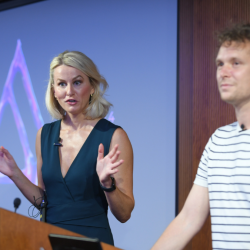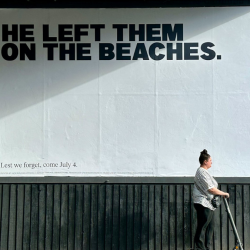Imposter Syndrome: ‘doubting your abilities and feeling like a fraud’. I’m not necessarily sure I knew what imposter syndrome was for some time, although I felt it. Whether it was feeling like a phoney at university or the penetrating sense of dread that I was ‘faking it until I made it’. The noise of the digital marketing industry is thrilling and supportive the vast majority of the time. But, if you’re anything like me, sometimes the flurry of information and overconsumption of social media that comes with the role can be overwhelming and make it challenging to know what to listen to as gospel. So, how do we learn to trust our own abilities and guts amongst the noise?
I decided to speak with some of the accomplished women at the agency I work for, Yard. These women inspire me every day to find out if imposter syndrome ever really goes away, because although I feel like I’m where I belong, I sometimes struggle to come to terms with the fact that I might actually be good at my job (even after working here for over a year).
“Whatever women do, they must do twice as well as men to be thought half as good. Luckily, this is not difficult.” — Charlotte Whitton
It didn’t shock me to discover that most of the women I spoke to felt that they were falling victim to imposter syndrome, simply because they are women. For our Lead Data Scientist, Emily Davies, imposter syndrome doesn’t necessarily mean doubting her ability. Instead, Emily tells me, “I think it’s more of an issue of how I’ll be perceived and respected as a young woman in a more senior role in a very male-dominated field.”
Our Head of Campaigns, Louise Ali, recently said to me, “it’s admirable that you want to take on the world, but we don’t want you burning out”, and I think that encompasses imposter syndrome for women perfectly. The belief that you always must be one step ahead, doing more, because if you’re not doing more you might as well be doing nothing.
It’s not new news that women and other marginalised groups experience imposter syndrome disproportionately more than men. The concept of imposter syndrome was initially developed in 1978 by psychologists Pauline Rose Clance and Suzanne Imes when they studied a focus group of — wait for it — highly-achieving women. Clance and Imes stated that, “Women who experience the impostor phenomenon maintain a strong belief that they are not intelligent; in fact, they are convinced that they have fooled anyone who thinks otherwise“.
Something that Louise struggled with particularly after her maternity leave in a previous role — a burden affecting two-thirds of women in the UK, compared to just over half of men. Louise aptly summarises that “often the onus is on women to smother their own imposter syndrome rather than focusing on the broader societal issue that women simply must work harder to prove their value”.
So, how do we overcome this phenomenon when the machine seems to be working against us?
Don’t knock it til’ you try it
Collette Easton, our CEO, tells me, “You are surrounded by opportunity: experiment, learn from your mistakes and remove your ego“. It’s easy to feel overwhelmed with your own best practices or expertise when we see so much conflicting advice in our networks but heck, give it a go! You’re only human. Not one senior level person in our industry woke up one day with the knowledge they have now.
What do you love to do? What different skills can you bring? Being different is good, but you’re not going to be an expert at everything you do, and the same applies to your career. It’s about finding your niche.
Re-evaluate your toolkit
Claire Marshall, our Account Director, tells me that “in order to be nimble and strive for what we believe in, we need the right toolkit. If we’re seriously feeling the effects of imposter syndrome, then we probably don’t have the entire toolset”.
With imposter syndrome, getting too much into your head will lead you to ‘worry burnout‘. Remember, no one is going to doubt your abilities because you’ve asked for a helping hand. By asking for help, you’re acknowledging that you’re always striving for the highest quality and have the business’s best interests at heart.
Keep a list of the new skills you’re learning and revisit them every other month. You’ll be surprised to see how much you’ve developed.
Get comfortable with the uncomfortable
It’s common to feel like you’ve bitten off more than you can chew. Feeling inadequate isn’t something you’ll only feel in the early days of your career. When Louise returned from her maternity leave she told me she believed the world had moved on, and worried that everyone had forgotten about her and that she’d forgotten how to do her job. Sound familiar?
Many times in our careers we’re going to feel uncomfortable when something changes. Chances are if you’re feeling uncomfortable in your abilities, it’s because you’re growing — and growth is scary. Discomfort is the ultimate catalyst for growth.































